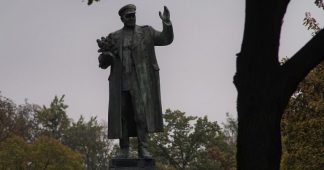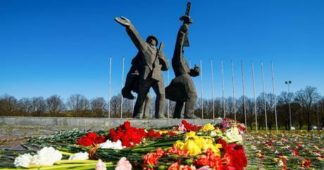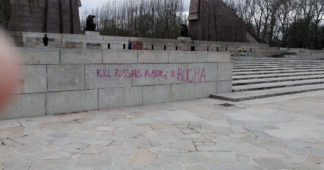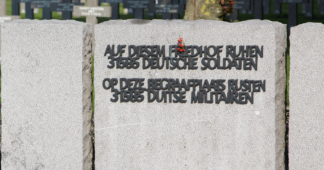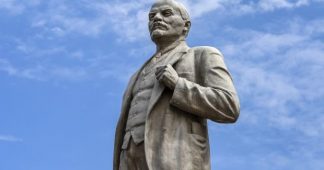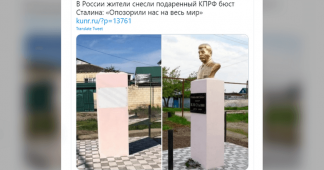FIR follows with concern the attacks on monuments of the Soviet liberators in various European countries
At the beginning of April, we had to experience with large dismay the desecration of the grave and memorial place for the Soviet liberators of Berlin in Treptow Park. Ostensibly as a protest against the war, fascist slogans and symbols were spray-painted on the memorial stelae and commemorative plaques. In the following days, despite increased surveillance, two more desecrations were recorded. During those days, the gravesite for 400 soldiers on Bassinplatz in Potsdam was also attacked. The memorial was doused with red paint. The Potsdam VVN-BdA calls this act a “falsification of history” and an “attack on the anti-fascist culture of remembrance”. The Soviet memorial in Neubrandenburg was also the target of such attacks.
Such desecrations had to be registered in other countries as well. In Austria, slogans were spray-painted with red paint at the Soviet military cemetery in Laa an der Thaya, a memorial site for over 450 Red Army soldiers who gave their lives for the liberation of Austria from fascism. The action makes it clear, as Austrian anti-fascists emphasized, that the current mood is to be exploited for a historical revisionist general reckoning with the achievements of the Soviet Union.
Such acts of vandalism also took place on the territory of Slovakia. A monument to Red Army soldiers was desecrated in the western Slovak town of Piešťany. The pictures of this desecration show that the symbol with which the monument was smeared is the emblem of the Ukrainian neo-Nazi Azov regiment. The Russian Embassy called on local authorities to restore the desecrated monument and punish those responsible.
Actions against memorials and commemorative sites to Soviet liberators have also continued in Ukraine. In the Ukrainian city of Kharkiv, members of the Azov neo-Nazis operating as part of the Ukrainian army toppled the monument to Soviet Union Marshal Georgy Konstantinovich Shukov. The dismantling of the monument allegedly took place on April 17. Koatiantyn Nemichev, a former fighter of the neo-Nazi Azov Regiment and head of the Kharkiv branch of the National Corps, released a video of the monument’s demolition and stated that it was dismantled by KRAKEN Special Forces. The video shows the statue being taken to a landfill.
Recently, authorities in Ukrainian cities have demolished various monuments and renamed topographical names associated with the USSR. In Ternopol, a monument to the Soviet pilot liberators was demolished, and in the city of Stryj, Lviv region, a monument to the Soviet soldiers who once liberated the city from the Nazis. The authorities of Mukachevo, Trans Carpathian region, removed a monument commemorating the liberation of the city in the Great Patriotic War, an obelisk of glory. In Rivno, a Soviet tank artillery unit was removed from its pedestal.
The latest scandal is currently playing out in Latvia. At the beginning of May 2022, the Latvian Parliament passed an amendment to the law allowing the demolition of the monument to the liberators of Riga in the Great Patriotic War. The Saeima, the Parliament of the Republic of Latvia, overruled Article 13 of the Agreement on the Preservation of Historical Monuments concluded by Riga and Moscow in 1994, thus creating the legal basis for the demolition of the Liberators’ Monument in the capital city, which the Riga City Administration is seeking. Seventy deputies voted in favor, 18 against.
While on “Victory Day” many people in Riga went to the monument with flowers and honored the liberators, the next day the city administration removed the sea of flowers and transported it to the landfill. More clearly the administration could not express its contempt for the liberators and the will of the population. During protests against this decision, Tatyana Zhdanok, a member of the European Parliament, was arrested in Riga.
The FIR protests in all sharpness against such undignified handling of the memory and all forms of the “disposal” of history. We emphasize again: Today’s Europe was created on the basis of military liberation from fascist barbarism. The Allied forces, the main burden of which was borne by the Soviet Army, liberated the various occupied countries and the then German Reich with the support and direct efforts of the partisans. To honor them appropriately is a responsibility of all people, who work for a peaceful Europe
We remind our readers that publication of articles on our site does not mean that we agree with what is written. Our policy is to publish anything which we consider of interest, so as to assist our readers in forming their opinions. Sometimes we even publish articles with which we totally disagree, since we believe it is important for our readers to be informed on as wide a spectrum of views as possible.
